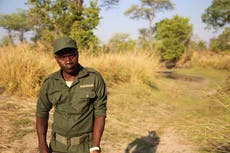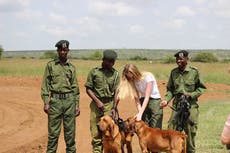Stop the Illegal Wildlife Trade: How artificial intelligence has become the latest conservation tool
We are working with conservation charity Space for Giants to protect wildlife at risk from poachers due to the conservation funding crisis caused by Covid-19. Help is desperately needed to support wildlife rangers, local communities and law enforcement personnel to prevent wildlife crime

Your support helps us to tell the story
From reproductive rights to climate change to Big Tech, The Independent is on the ground when the story is developing. Whether it's investigating the financials of Elon Musk's pro-Trump PAC or producing our latest documentary, 'The A Word', which shines a light on the American women fighting for reproductive rights, we know how important it is to parse out the facts from the messaging.
At such a critical moment in US history, we need reporters on the ground. Your donation allows us to keep sending journalists to speak to both sides of the story.
The Independent is trusted by Americans across the entire political spectrum. And unlike many other quality news outlets, we choose not to lock Americans out of our reporting and analysis with paywalls. We believe quality journalism should be available to everyone, paid for by those who can afford it.
Your support makes all the difference.To the naked eye, it’s a pitch-black photograph with a few shrubs and the petals of a white flower glinting in the moonlight. But a closer look by artificial intelligence reveals the forehead of a giant forest elephant.
Artificial intelligence has emerged as a new weapon in the battle for wildlife conservation in Lopé National Park in Gabon. Through machine learning, an algorithm is now able to identify over 25 species for researchers in the Congo Basin, which otherwise would have been missed by humans.
Researchers from Stirling University, who have a long-running partnership with the Agence National des Parcs Nationaux du Gabon (ANPN), supported by funding from the European Union’s ECOFAC 6 programme, set up camera traps in the rainforest to monitor wildlife.
They teamed up with artificial intelligence company Appsilon to use image recognition technology, known as Mbaza AI, to analyse large numbers of photographs taken in the rainforest. The 200 cameras, spread out across the Lopé National Park, are triggered by motion sensors and each take hundreds of pictures per day.
The head of the biodiversity monitoring programme, Stirling’s Dr Robin Whytock, invited Appsilon to apply its technology to automate and improve the analysis of photos, which otherwise must be performed manually by rangers and researchers. A database of over 1.5m photos trained the algorithm to classify as many as 3000 images per hour with an accuracy rate of 96 per cent.
Dr Whytock said: "Central African forest mammals such as elephants, gorillas and pangolins are threatened by unsustainable trade, land-use change and the global climate crisis. Appsilon's work on the Mbaza AI app, will allow conservationists working on the ground in Central Africa to rapidly analyse wildlife data collected using automated camera traps, reducing the lag between data collection and analysis from months or years to just days.
“This will enable conservationists to rapidly identify and respond to threats to biodiversity and improve conservation management at a time of global biodiversity crisis."
Mbaza AI, which does not require any specialist hardware or even an internet connection, allows rangers to estimate populations of animals that are difficult to monitor, like forest elephants. It also allows them to track animals and their movements, as well as gain a better understanding of their behaviour through facial recognition, which is especially important for primates with complex social hierarchies.
Dr Lee White, Gabon’s minister for the environment and a British-born conservationist, added that the software has potential for anti-poaching purposes too. Over 200 animal and plant species are considered threatened in Gabon, including the African Forest Elephant, which across Africa has seen 70 per cent of its population wiped out in the last 15 years, leaving Gabon as a crucial sanctuary for the remaining population.
The Appsilon algorithm has also been used in Gabon to track the spread of a skin disease known as Yaws, which is spread by bacteria to great apes as well as humans. There is currently no vaccine for this disease, which mainly affects children.
Dr White said: “It is our ambition to use ‘Mbaza’, the name for a traditional guard house, to roll wildlife monitoring out across all of Gabon's protected areas and forestry concessions.”



Join our commenting forum
Join thought-provoking conversations, follow other Independent readers and see their replies
Comments